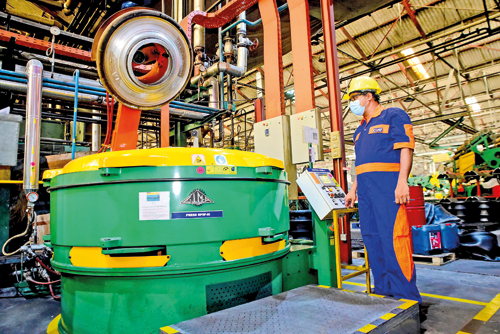Fishing in troubled waters
View(s):
File picture of the CEAT tyre factory, a good example of local labour and foreign technical input.
Gamini has a business; his company is engaged in both imports and manufacturing. He is a close friend of mine too; when it comes to “government support” for business, he and I are in two different ideological positions and, I must tell you why. I look at it from an “overall economic point of view”, while he looks at it from “his own business point of view”. Then you might ask “what’s the difference?”
The difference is big: From an overall economic point of view, I know that a country – especially, a small country like ours, cannot produce everything we want. As a country, we need millions of things for both our consumption and production as a nation. Given the right policy environment, a country chooses to produce “certain things” but not everything. Moreover, I know that these “certain things” are best known to the businessmen and, not known to politicians or policy makers or academics.
Therefore, it is the businessmen who find such opportunities and put their money in order to start businesses. It is the duty of policy makers and politicians as well as, perhaps academics too, to create that enabling environment to facilitate the realisation of the business ideas of businessmen.
State support
Gamini, who has both managerial and engineering experience, also has a different opinion. His heart is in “producing things locally” rather than importing them. By producing locally, he says that more value can be added, more jobs can be created, and more foreign exchange can be saved. True enough; I have nothing against that idea, which I always admire.
However, the problem is that his idea is conditional – government should support it providing a protected market with import controls and tax incentives. My economic view is that it may work for “some” businessmen at the expense of all of their customers who lose the customer choices; as a result, they have to pay higher prices for lower quality! The success of “some” businessmen is not the success of the overall economy.
I hope our ideological difference is clear enough. Accordingly, two of us often get caught up in debates – of course, fruitful debates without losing our friendship. I am of the view that our import controls are too much, but believes that they are too little; I hold the view that there are many other barriers to businesses in this country, but his focus is merely on “protection” and “tax incentives” which can compensate for the other barriers.
Domestic production
It was in the midst of all this that new import controls came in, which put his faith to test. The most important among all the news he brought to me was his own idea of initiating a local product of his own – an electrical equipment, replacing its imported product. He thought that this is the right policy environment to initiate this local product.
Gamini is convinced that he can supply it profitably to the local market, ousting imports. According to his plan, the original equipment manufacturer (OEM) in China can supply parts and components which will be imported and, then assembled here to bring out the “new branded” local product. Because all parts and components are still the same as in the imported product, in his view, the new local product will also be as good as the imported one.
After all these, he still had a few more problems to sort out – all of them are related to the country’s regulatory system. While explaining his intention to add domestic value to the product, he pointed out one of the important problems that he has encountered. “I have to certify that it has at least 30 per cent local value addition. If I can prove that, then, I can also claim the benefit of an excise duty waiver.”
Contradictory proposal
He explained to me how some of the businesses have made up that 30 per cent value addition one way or the other and, receive that discriminatory tax benefit; as a result, such products are more profitable than the competing imports in the local market.
I replied: “You can use local parts too up to 30 per cent value addition.”
He explained: “It is difficult, because this particular equipment has no reliable suppliers of local parts”.
 I teased him with a piece of advice: “That’s because they haven’t got protection from imports, as you used to argue; we must ask the government to bring these parts under import controls at least under high import duties. Then, there will be local producers to initiate production of such parts and components as well.”
I teased him with a piece of advice: “That’s because they haven’t got protection from imports, as you used to argue; we must ask the government to bring these parts under import controls at least under high import duties. Then, there will be local producers to initiate production of such parts and components as well.”
Obviously, he cannot agree with what I proposed, because it would raise his cost, as well as perhaps, downgrade its quality too. He must find a way “somehow” to show raising 30 per cent domestic value addition in his product.
He put forward another important problem that he must face: His intended product still carries import duty concessions, because it is primarily an electric equipment that can be used for business purposes. Because of this duty concession, he still has a price competition in the local market which would lower his profit margin.
He has an idea: “I must convince the government to raise import duty on the imported product so that I can produce it profitably.”
“Wait a minute!” I asked: “In the earlier case, you wanted to get the import duty eliminated on imported inputs because it affects your costs and quality. Now in this case, you wanted to get import duty increased on your product because you want to keep your profitability. How do you intend to bring this contradictory proposal to the government?”
He had an answer: “This is for domestic production and it would add more value, create more jobs and save foreign exchange! If our government appreciates all that, this business is worthy of getting government support.”
Unholy alliance
It is difficult to reject Gamini’s argument, if we go by his intention to start a domestic production. But nevertheless, let’s look at it from an economic point of view.
The first problem is what is right for Gamini may not be the right thing for everybody. His proposal to increase the import duties on competing imports would raise the price of this product hurting other businesses using it; his proposal to eliminate import duties on his inputs will also hurt the potential local producers of these inputs. Accordingly, there is a possibility that the “net outcome” of that proposal could be a loss to the economy.
The second is about the politics of Gamini’s proposal: The policy decision on his proposal will be more political than economic. Because his proposal hurts other businesses, the lobby for opposing his proposal can also arise. In such situations, whether the decision is in favour of Gamini or someone else is determined by who gets the political blessings or bureaucratic favours; it is mostly the small businessmen who lose without an influential voice.
Regulatory economic systems often create room for political interferences and corruption. It has been a well-documented case that in all of the “regulatory economic systems” there have been unholy alliances among politicians, bureaucrats and businessmen.
Politics over economics
The final comment is about the entire country in which there are millions of parts, components, and final products produced and imported all the time. You may succeed in applying Gamini’s theory for a couple of products, but apparently not for all these products. Any government that is trying to do that may end up even wasting the valuable time of politicians and bureaucrats, because they have to handle the issues of products “one-by-one”. And there will be hundreds of “ad hoc” decisions scattered everywhere without a clear policy direction; does it work for a country?
Anyway, I gave my assessment to Gamini: Well, you are not the only person doing business here and, your product is not the only product that needs protection either. When it comes to your proposal, ‘all what you get or what you don’t get’ will be a political decision and, not an economic decision. If you are influential enough, of course, you will get all what you want. Perhaps, using an economic jargon, we can call it a strategy of “picking winners”.
(The writer is a Professor of Economics at the University of Colombo and can be reached at sirimal@econ.cmb.ac.lk and follow on Twitter @SirimalAshoka).



